Flo Ziegfeld was topic of no less than three MGM movies of the 1930s and 1940s, a major character in a biopic of his biggest star, Fannie Brice, remembered in a complex Stephen Sondheim musical of the 1970s, and his last name has been called on to describe those with aspirations toward giant-sized stage productions. "So what were you thinking, Ziggy?" And yet he did not act, did not perform, did not write music, and usually did not present himself for publicity. What did "The Great Ziegfeld" do? He aspired. He planned. He motivated. And he never gave up. He did not invent, but instead perfected a particular genre of stage show, and his influence was felt throughout the 20th century in lavish presentations both on stage and on film. His association with beautiful and talented woman, and a handful of them in particular, is legendary in many regards. He also had a unique if indirect connection with more than a handful of fine musicians of the ragtime era. And yet it all started with a muscle man. Here is a hopefully unique perspective on Florenz Ziegfeld's contributions to the American stage, as well as his launching pad for many great musical talents from 1907 into the late 1920s.
In His Father's Footsteps?
As he appeared to actually be the third in line from his German-born grandfather, it is unusual that Florenz Ziegfeld was regard as a Jr., given that both his father and grandfather had the same name. There may have been a difference in the middle name, which could account for why he was not Florenz Ziegfeld III. Flo was the oldest child of German-born musician Dr. Florenz Ziegfeld II and his young Belgian bride Rosalie DeHez, followed by Carl O. (10/30/1869), Wiliam Kimball (10/21/1872) and Louise Theodora (1875).
Dr. Ziegfeld had already established a music studio, and had regular recital events even before 1870. In the 1870s he established The Chicago Musical College. A number of fine composers and musicians of the ragtime era attended that school in the 1880s and 1890s, many taught personally by Dr. Ziegfeld.
However, even when given a musical education at no cost, Flo appeared to have little aspiration to enter that field as a performer. The immersion he had to have experienced as a child obviously did have some positive effect on him just the same, as he would remain involved in the best possible popular and even classical music from the late 1890s until his death.
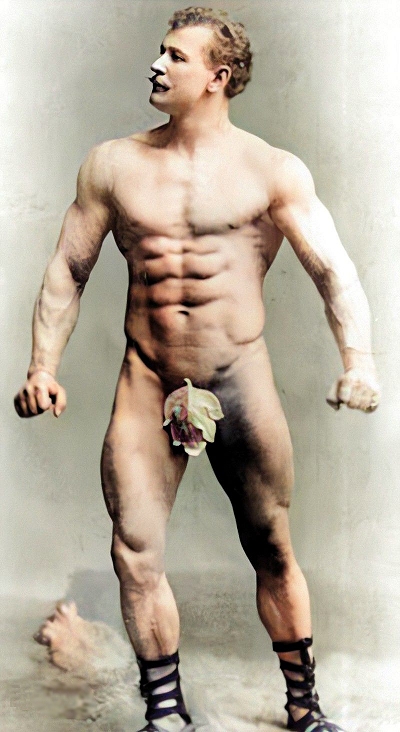 |
During the 1893 Columbian Exposition in Chicago, he had a handful of acts on the Midway, the strongest of them literally a strong man, the "Great Sandow." Not only did Eugene Sandow show off impressive feats of strength, but Ziegfeld found a way to attract the attention of the ladies, who were more than willing to touch his rippling muscles and be titillated by his sheer masculinity.
Ziegfeld tried to promote Sandow and a few other acts beyond the fair, touring with him to vaudeville theaters and other fair-like venues. But he still lacked that something sensational that would make his name, and aspired to something much more. By 1895 Flo was living in New York City as that is where the best opportunities appeared to be in his field, although he was faring only moderately. Taking a trip to Europe in 1896 he caught the act of the lovely young Polish-born singer Helene Anna Held, and was quickly smitten by her talent and more. After experiencing Anna's salacious act on stage he was immediately entranced the opportunities she presented. It took some charm and persuasiveness, but Flo was able to convince Anna to come with him to New York after her run in England was finished.
Anna Held and The Great Idea
Anna had talent and a name, at least in Europe, but it would be harder to create an American audience for her particular style of entertainment. The Parisian accent that she affected worked well enough in English to add to her "innocent" charm.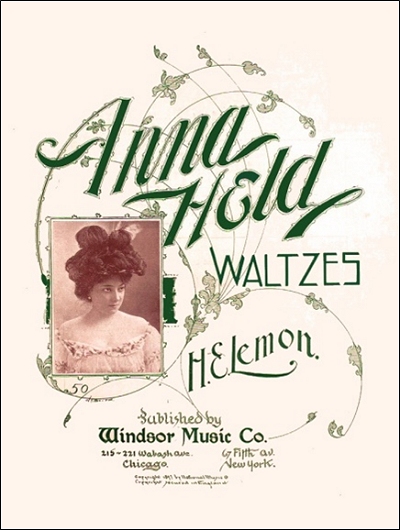 However, Flo, who evidently cared deeply for Anna, also saw her as a commodity that needed marketing, so he went about doing exactly that, starting out with a subtle introduction as part of a show. This included a well-planted story about his difficulties and expense of attaining Mlle. Held for the engagement.
However, Flo, who evidently cared deeply for Anna, also saw her as a commodity that needed marketing, so he went about doing exactly that, starting out with a subtle introduction as part of a show. This included a well-planted story about his difficulties and expense of attaining Mlle. Held for the engagement.
 However, Flo, who evidently cared deeply for Anna, also saw her as a commodity that needed marketing, so he went about doing exactly that, starting out with a subtle introduction as part of a show. This included a well-planted story about his difficulties and expense of attaining Mlle. Held for the engagement.
However, Flo, who evidently cared deeply for Anna, also saw her as a commodity that needed marketing, so he went about doing exactly that, starting out with a subtle introduction as part of a show. This included a well-planted story about his difficulties and expense of attaining Mlle. Held for the engagement.She was inserted into a revival of A Parlor Match, the story of a hobo or grafter who concocted a scheme to separate a millionaire from his millions. It involved a spirit cabinet he rigged that had ghosts that came out of it, Anna being one of those ghosts. It gave her the opportunity to introduce the interpolated piece Won't You Come and Play with Me, for which she had already become famous in London and Paris. Of course the English from her lips made it sound more like "play wiz me," which managed to capture the opening audience with its charm. A frenzy built to the point where when she left the premiere, several "admirers" unhooked her carriage from the horses and pulled Anna through the streets of midtown Manhattan to a hotel (however, not hers) — at least long enough for the press to find a story. There are good odds that her legion was arranged by Flo. The stunt worked, got her name in the papers, and sold tickets, which was, of course, the primary goal.
Then there was the stunt to end all stunts — something that worked well for Ziegfeld, but which he was never able to trump, and would for years be viewed as an opportunist (which he was) trying to out-outlandish himself. He got the idea to tell the public — giving exclusives to several newspapers — that Anna looked as supple as she did because she bathed in forty gallons of milk two or three times a week. This literally white lie instantly aroused interest, and even created a temporary surge in milk sales as others doubtless tried this expensive and wasteful indulgence. It did not take long to backfire, as was reported in the New York Herald October 10, 1896:
Anna Held yesterday informed her lawyer, Colonel Taliaferro, that she had been sued for the value of 320 gallons of milk, and he said: - "But of course, you never got it."
"Oui, m'sieu," placidly answered Miss Held, "I haf ze most of eet had, and used eet, but eet was not good"
"Well," said her attorney, "I would imagine a person would rather have a distaste for milk after about the one hundredth gallon, in the short time you have been here?"
"Non, non," chirped the chic Parisienne, ecstatically clasping her hands; "I could sweem in eet forevaire."
In short, with Ziegfeld present in the room, she continued to claim that the bad milk had given her wrist pimples. She stated that her doctor said "that I should haf ze milk bath, and I'haf.
For thirty minetes I lie in eet, and am made strong." However, even the lying was likely about the bath rather than in it, she was sued by a dairy for $64 claiming that their reputation had been spoiled by the mention of their name in a previous article, even though they had never actually provided the product. Ziegfeld settled it immediately, having accomplished his goal of putting his ingénue in the newspapers and in the minds of the ticket-buying public.
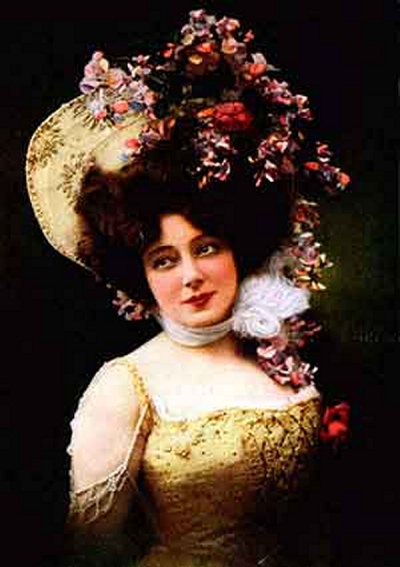 |
Now that Anna Held was known by the public, it was not hard to find properties for her to sing or act in, with Ziegfeld managing what she did and where. In fact, having obtained an apartment for her, Flo was also cohabitating with the starlet for the most part. This led to the usual hushed speculation and occasional suggestive mention in the newspaper as to their status. The truth is that no actual marriage certificate or mention of one has ever been found. This is further compounded by the fact that Anna was still married to Uruguayan gambler Maximo Carrera, with whom she had also had a child, Lianne "Anna" Carrera, born near the end of 1894. By now, Maximo was off doing his own thing on other continents. Reports vary on whether Held and Carrera actually obtained a divorce, anywhere from 1897 to 1908, the latter being the year that Carrera passed away. When she and Flo eventually "divorced," it was divulged that they were married "by promise" with no ceremony on March 28, 1896.
As Anna and Flo started "considering themselves as a married couple" as early as 1896, they would have been married by proxy of common law around 1904, save for any hints of bigamy on her part. The less than reliable story that the papers reported both years before and then at the time of her death about their Paris "marriage" was not revealed to the public until 1899. In 1915, this became a matter of convenience for Anna. When there was question as to whether she had been born in Warsaw or Paris, it made obtaining a passport a challenge for the actress, who was no longer with Ziegfeld. However, the court recognized her relationship with him as a legal marriage, which in turn granted her an American citizenship by proxy.
Ziegfeld continued to find properties that would exploit the best of Anna, and she played along. After A Parlor Match she found success through a bit of typecasting as the lead in French Maid, which had a short run in 1897. This was followed La Poupee, which opened on October 21, 1897. Her next show in 1898, Papa's Wife, was a substantial success for both Held and Ziegfeld.
Through all of this, while Anna was a star, it was more in the sense of her as a novel celebrity, not as a serious actress or first rate singer. She knew how to sell a song using her assets,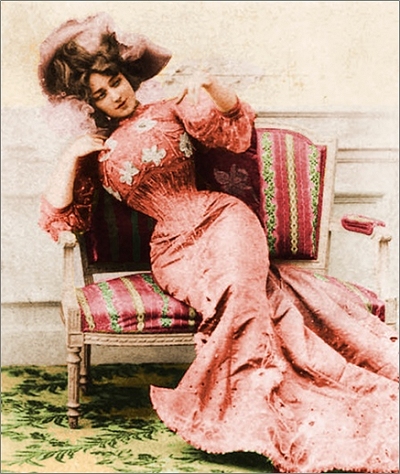 which helped to fill in the gaps for the other talents she lacked. It should also be considered that Ziegfeld's ability to plant outrageous stories about her exploits, some in conjunction with his, also added to her overall allure. That she was French gave her an edge over other singers and actresses of that time who often made their name by riding the line between naughty and barely acceptable, including the outrageous Eva Tanguay who sometimes made headlines because of what she was not wearing. Even at that, Anna was not so much tawdry, but more like naughty innocence with a sly wink.
which helped to fill in the gaps for the other talents she lacked. It should also be considered that Ziegfeld's ability to plant outrageous stories about her exploits, some in conjunction with his, also added to her overall allure. That she was French gave her an edge over other singers and actresses of that time who often made their name by riding the line between naughty and barely acceptable, including the outrageous Eva Tanguay who sometimes made headlines because of what she was not wearing. Even at that, Anna was not so much tawdry, but more like naughty innocence with a sly wink.
 which helped to fill in the gaps for the other talents she lacked. It should also be considered that Ziegfeld's ability to plant outrageous stories about her exploits, some in conjunction with his, also added to her overall allure. That she was French gave her an edge over other singers and actresses of that time who often made their name by riding the line between naughty and barely acceptable, including the outrageous Eva Tanguay who sometimes made headlines because of what she was not wearing. Even at that, Anna was not so much tawdry, but more like naughty innocence with a sly wink.
which helped to fill in the gaps for the other talents she lacked. It should also be considered that Ziegfeld's ability to plant outrageous stories about her exploits, some in conjunction with his, also added to her overall allure. That she was French gave her an edge over other singers and actresses of that time who often made their name by riding the line between naughty and barely acceptable, including the outrageous Eva Tanguay who sometimes made headlines because of what she was not wearing. Even at that, Anna was not so much tawdry, but more like naughty innocence with a sly wink.As for music, she mostly provided lyrics to songs, but did come up with a few of her own melodies — at least with the help of ghostwriters obtained by Flo. Even if she only made suggestions, there were a number of songs with her name on them that she clearly owned, not the least of them being It's Delightful to be Married. Her first work, The American Girl, was published in newspapers in 1898. Her authorship is perhaps a bit suspect, given her limited time in America at that juncture, but some benefit of the doubt might be extended to Anna since contrary information has not been uncovered. As she needed to learn a better command of English to perform on American stages, this helped her in writing as well.
From 1901 to 1905 Flo put Anna in a number of New York City shows that kept her in front of the public and within his sights. At least he knew where she was, which made it easier for him to engage in occasional philandering, even though he remained publicly devoted to his rising star. Anna also went on tours to Boston, Chicago and the Midwest with the shows, some of which had more success out of town than in. For Ziegfeld there was some level of frustration that as an entrepreneur and showman he was not able to produce a genuine hit show, even with a moderately famous wife.
The critics were hard on him and those who wrote for him. One of the more famous quotes came from a review of Mam'selle Napoleon in 1903, a show full of dancing girls (named the Anna Held Girls) and lavish gowns. Unmoved by the quality of the wardrobe which did not forward the plot, one critic acerbically noted that "Between gowns, the plot crept in."
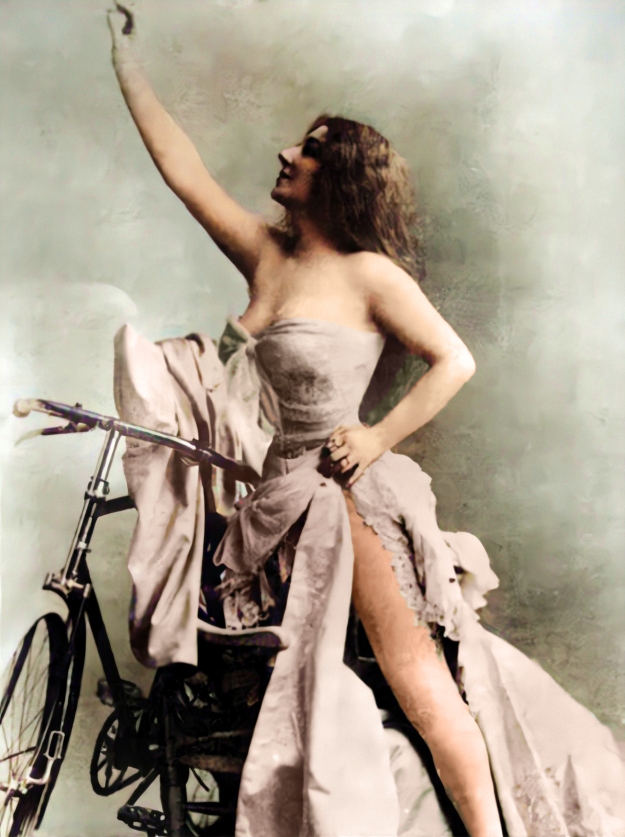 |
One of the more obvious assets of Anna Held, although one difficult to ascertain from the 22nd row, was her eyes. To that end, a couple of songs were composed for her that drew attention to them, including I Just Can't Make My Eyes Behave by seasoned writers Gus Edwards and Will D. Cobb. In her by now storied French accent, Anna feigned frustration when saying "My lips may say, 'run away from me.' But my eyes say 'Come and play with me!" It was clearly a flirt directed at every male in the audience, and one that was translated into ticket sales in spite of weak plots and production values.
Ziegfeld was having his own issues from 1904 to 1906, largely in getting backers or theaters for some of his shows, given his lavish demands at times and strained relations with Lee and J.J Shubert, Abraham Erlanger, Marcus Klaw, and other theatrical magnates. So he took some time off in 1906 to accompany Anna to Europe and ponder his next move. While there, another one of his obsessions took hold and created somewhat of a rift between himself and Anna, that of gambling. While he had done enough gambling with chancy shows, there were often ways to recover from that. However, at the casino tables of Europe he did not fare so well, and Anna clearly objected to this. Her response to any anger she felt was often costly, as she would run off to dine with friends or shop for more clothes. Between them they ran up a rather staggering debt that summer.
It is therefore ironic yet fitting that Anna was responsible for Ziegfeld's greatest success and his legacy. While she was successfully engaging audiences in the fall of 1906 in A Parisian Model, she had a bigger plan in mind. In a conversation with Flo, a point he confirmed in later years, Anna suggested that he might consider staging a show like the lavish revues they had seen in Paris, including those of the Moulin Rouge and the Folies Berger. After some consideration, Florenz Ziegfeld followed his wife's advice and with some good consultants cooked up the first edition of the Ziegfeld Follies in 1907, held on the rooftop garden of the New York Theater, which she renamed Jardin de Paris for the occasion.
Follies or Folly?
The idea took off quickly, and each year they became more elaborate Ziegfeld, now the Great American Showman, banked on production values, high quality stars, and the best music, being one of the first to hire songwriters to develop a revue rather than a plotted show.
The Great Ziegfeld - Glorifying the American Girl
A Change in Fortune
Ziegfeld's Legacy
This is a work in process for Summer 2017

 Selected Stageography
Selected Stageography